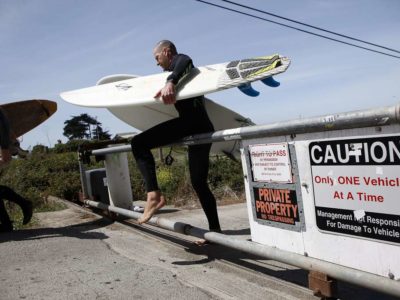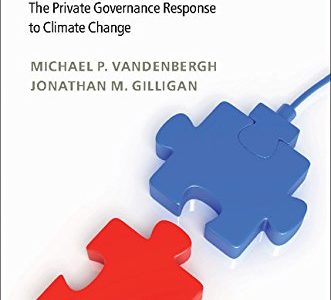Region: California
Contentious California Beach Access Case Heads to U.S. Supreme Court
Longstanding Martins Beach Controversy May Well Capture Justices’ Attention
The U.S. Supreme Court’s 2018-19 Term is already shaping up as a big one for environmental law in general and the longstanding tension between private property rights and environmental regulation in particular. The Court has already agreed to hear and decide two cases next Term raising the latter set of issues: one involves the question …
Continue reading “Contentious California Beach Access Case Heads to U.S. Supreme Court”
CONTINUE READINGGoing Private
A new book argues that businesses and individuals can take the lead in reducing emissions.
Beyond Politics: The Private Governance Response to Climate Change, by Michael Vandenbergh and Jonathan Gilligan, is an ambitious effort to demonstrate the promise of non-governmental efforts to reduce emissions. They argue it is a mistake to pin all our hopes to one climate strategy like a national cap-and-trade system. For this reason, they argue that …
Continue reading “Going Private”
CONTINUE READINGGuest Blogger Ken Alex: Political Will to Address Greenhouse Gas Emissions
Post #9 in a Series on California Climate Policy by Ken Alex, Senior Policy Advisor to Gov. Jerry Brown
[This is the ninth post in a series expressing my view of why California’s actions on climate change are so important and how they will change the world. The introductory post provides an overview and some general context.] I said at the outset of these blog posts that political will and the issue of scale are bigger …
Continue reading “Guest Blogger Ken Alex: Political Will to Address Greenhouse Gas Emissions”
CONTINUE READINGGuest Blogger Ken Alex: Reducing Emissions is Not Enough
Post #8 in a Series on California Climate Policy by Ken Alex, Senior Policy Advisor to Gov. Jerry Brown
[This is the eighth post in a series expressing my view of why California’s actions on climate change are so important and how they will change the world. The introductory post provides an overview and some general context.] Under the Paris Agreement, countries agreed to hold the increase in the global average temperature to “well below 2°C …
Continue reading “Guest Blogger Ken Alex: Reducing Emissions is Not Enough”
CONTINUE READINGThe Return of Federal Common Law
Will the federal courts take over control of climate change litigation? One judge says so.
I’m traveling but wanted to get in a few quick words about Judge Alsup’s decision today in the California climate change litigation. This is a really complex issue, and I wanted to try to unpack it a bit. In general, except where a federal statute or constitutional provision is the basis for an action, legal …
Continue reading “The Return of Federal Common Law”
CONTINUE READINGProgress on California water data
Michael Kiparsky and Alida Cantor
Water data has become quite a hot topic in California, and rightly so: throughout the state, decision-makers desperately need better information to guide their efforts to better manage this resource. Recent legislation has gotten us to the starting line, but how well new data platforms ultimately serve water management will depend on clear thinking and …
Continue reading “Progress on California water data”
CONTINUE READINGGuest Blogger Ken Alex: Resilience and Adaptation
Post #7 in a Series on California Climate Policy by Ken Alex, Senior Policy Advisor to Gov. Jerry Brown
[This is the seventh post in a series expressing my view of why California’s actions on climate change are so important and how they will change the world. The introductory post provides an overview and some general context.] Climate change has arrived. Our fire season never ends; we no longer know if we will have a rainy …
Continue reading “Guest Blogger Ken Alex: Resilience and Adaptation”
CONTINUE READINGSurveying the Landscape of Local Zoning and CEQA
First report from Berkeley/Columbia research project shows how Bay Area residential developments negotiate land-use and CEQA review
A group of interdisciplinary researchers from law and planning (which I am part of) just released its first report on how CEQA and land-use law shape the process of regulating and approving residential developments in five Bay Area cities. (I first posted about our research here.) I’ve included the Executive Summary below, and the full …
Continue reading “Surveying the Landscape of Local Zoning and CEQA”
CONTINUE READINGScott Pruitt: “What, me worry?”
The right question about greenhouse gas emissions is not whether there is an “ideal” global temperature regime, but what problems rapid regime shifts produce
(Readers of a certain age will understand the reference, and see the resemblance. If that’s not you, never mind. But read on for a little less snark and a little more analysis.) According to the Washington Post, EPA Administrator Scott Pruitt wondered in a television interview Tuesday whether global warming “necessarily is a bad thing,” …
Continue reading “Scott Pruitt: “What, me worry?””
CONTINUE READINGGuest Blogger Ken Alex: Methane, Black Carbon, and HFCs
Post #5 in a Series on California Climate Policy by Ken Alex, Senior Policy Advisor to Gov. Jerry Brown
[This is the fifth post in a series expressing my view of why California’s actions on climate change are so important and how they will change the world. The introductory post provides an overview and some general context.] One of the most important actions we can take to combat climate change is to halt the emission of …
Continue reading “Guest Blogger Ken Alex: Methane, Black Carbon, and HFCs”
CONTINUE READING







